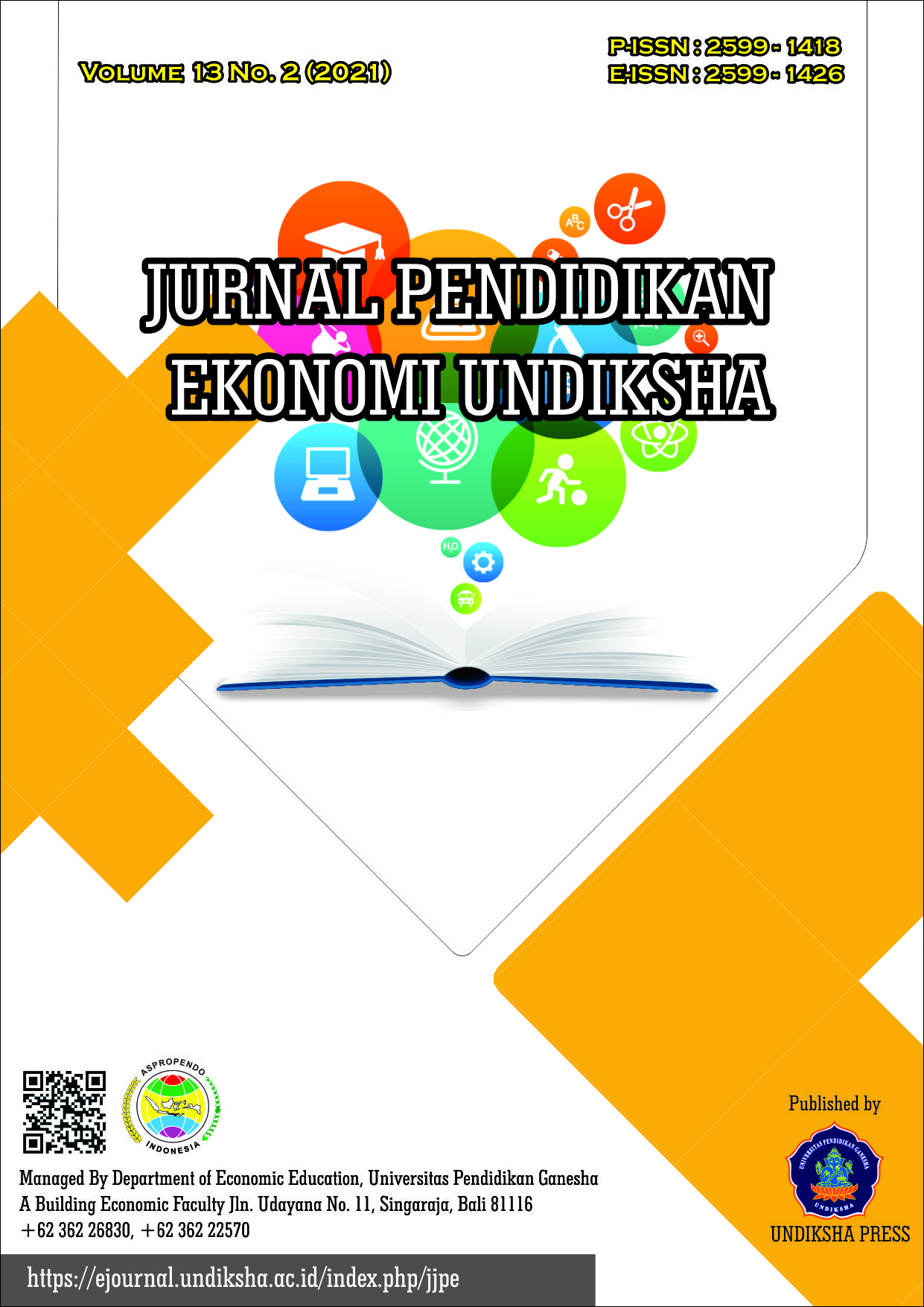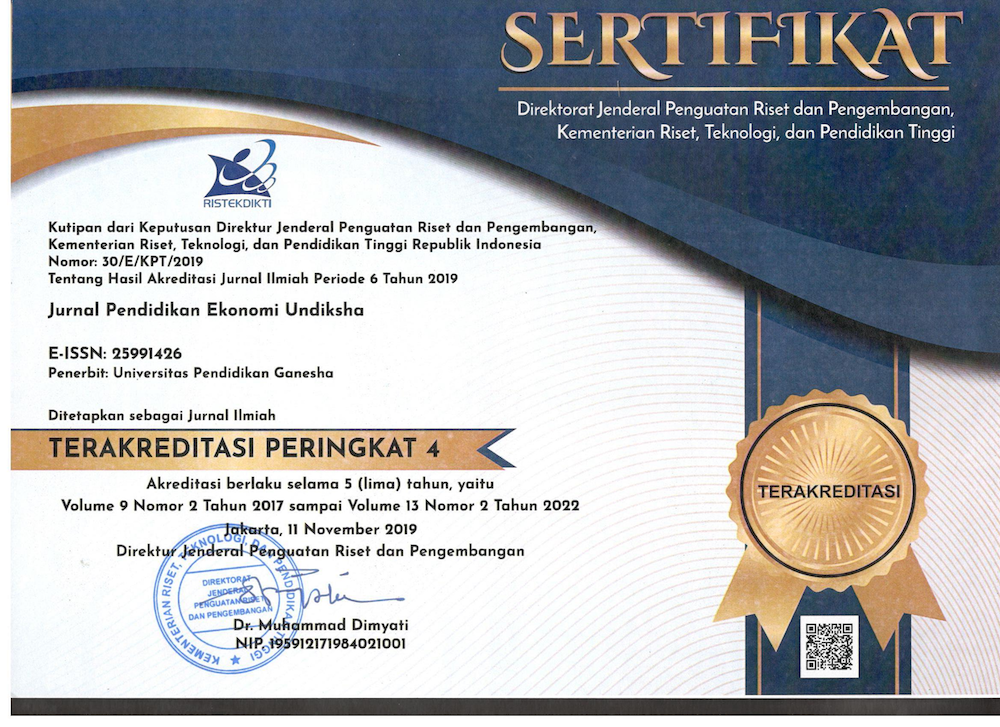The Effect of Participatory Leadership Styles and Organizational Culture on Employee Performance With Employee Engagement as an Intervening Variables (Study at Bali Royal Hospital Denpasar)
DOI:
https://doi.org/10.23887/jjpe.v13i2.41608Keywords:
Participatory Leadership Style, Organizational Culture, Employee Engagement, Employee PerformanceAbstract
This study is related to how the direct and indirect influence of participatory leadership style and organizational culture on the employees performance of Bali Royal Hospital Denpasar with employee engagement as an intervening variable. The sampling technique used in this study was the proportionate stratified random sampling technique as many as 97 people who are permanent employees at the Bali Royal Hospital Denpasar. Data is analyzed with classical assumption tests, hypothesis test, path analysis. Analysis was performed using spss version 23 software. The results showed that there was a positive and significant direct influence between participatory leadership style, organizational culture and employee engagement on employee performance. The results showed that the employee engagement variable was not a mediating variable for the influence of participatory leadership style on employee performance, but the employee engagement variable was a mediating variable for the influence of organizational culture on employee performance.
References
Arikunto, & Suharsimi. (2006). Research Procedures, A Practice Approach. Jakarta: PT Rineka Cipta.
Bakker, A. B., & Demerouti, E. (2008). Towards a Model of Work Engagement. Career Development International, 13(3), 209–223. https://doi.org/10.1108/13620430810870476
Davis, Russell, Cates, & Steven. (2018). The Implementation of The Organizational Culture Assessment Instrument in Creating a Sucessful Organizational Cultural Change. International Journal of Business & Public Administration, 15(1), 71–94.
Firidinata, A. P., & Mas’ud, F. (2017). The Influence of Paternalistic Leadership Style and Organizatinal Culture on Employee Performance with Employee Engagement as an Interventing Variable. Diponegoro Journal of Management, 6(4), 1–10. https://ejournal3.undip.ac.id/index.php/djom/article/view/17939
Ghozali, I. (2012). Application of Multivariate Analysis with the IBM SPSS 20 Program. Semarang: Publisher Agency-Diponegoro University.
Hasibuan, S. P. (2007). Human Resource Management. Jakarta: Bumi Aksara.
Joushan, S. A., & Syamsun, M. (2015). The Influence of Organizational Culture and Employee Engagement on Employee Performance at PT PLN (Persero) Bekasi Area. Journal of Management Applications, 13(4), 697–703. https://jurnaljam.ub.ac.id/index.php/jam/article/view/820
Kartono, K. (2008). Leaders and Leadership. Jakarta: Raja Grafindo Persada.
Kotler, K. (2009). Management Marketing. Jakarta: Erlangga.
Kotter, J. P., & Heskett, J. L. (1997). Coorporate Culture and Performance.
Law of the Republic of Indonesias Number 44 Year 2009 on Hospitals. (2009).
Lousyiana, T. H., & Harlen. (2015). The Influence of Leadership Style and Organizational Culture on Job Satisfaction and Performance of Nurses at Ibnu Sina Islamic Hospital Pekanbaru. Journal of Business Management Tepak, 7(3), 509–521. https://jtmb.ejournal.unri.ac.id/index.php/JTMB/article/view/3021
Mangkunegara, A. P. (2005). Human Resources Company. Badung: Youth Rosdakarya.
Moretti, M., & Postruznik, N. (2011). Stress Management And Employee Engagement: A Case Study. Europe: Armida Publications.
Papalexandris, N., & Galanaki, E. (2009). Leadership’s impact on employee engagement: Differences among entrepreneurs and professional CEOs. Leadership and Organization Development Journal, 30(4), 365–385. https://doi.org/10.1108/01437730910961685
Rahayu, S. A., & Surahman, E. (2012). Peran Kepemimpinan dan Employee Engagement Terhadap Kinerja Individual Karyawan Instalasi Farmasi. Jurnal Farmasi Klinik Indonesia, 1(3), 117–126.
Robbins, & Judge. (2008). Organizational Behavior. Jakarta: Salemba Empat.
Robinson, M. D. (2004). Personality as Performance: Categorization Tendencies and Their Correlates. SAGE Journals, 13(3).
Siddhanta, A., & Roy, D. (2010). Employee Engagement-Engaging the 21st Century Workforce. Asian Journal of Management Research.
Sugiyono. (2015). Comprehensive Action Research Methods. Bandung: Alfabeta.
Utama, S. (2016). Applications of Quantitative Analysis. Denpasar: Main Literature.
Yudha, D., & Fikri, H. T. (2015). Relationship between Employee Engagement and Performance of Hospital Nurses in Kota Pariaman. Journal of RAP UNP, 6(1), 1–10. http://ejournal.unp.ac.id/index.php/psikologi/article/view/6645





